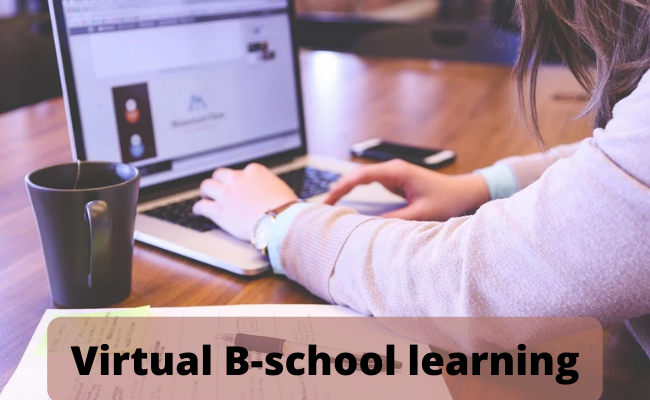
What has the pandemic driven educational institutions to? B-schools today have been steered into complete transformation in their teaching models. And this does not look like a temporary scene as of now. The global crisis has forced everyone to change their lifestyles.
People all over the world are still getting used to the new norm. Starting with complete denial and acceptance of facing the crisis, many are now asking the government to help them tide through this catastrophe.
Like every other sector, the education sector the world over has been forced to remodel itself into a new norm in imparting knowledge. B-schools have not only revamped their working, but also the curriculum.
Much of the curriculum will have to evolve with the refurbished model of business and working processes. B-schools have to give a good face-lift to their structure to facilitate their students in facing the overhauled working mould.
What are the changes?
Premier institutions like the IIMs, XLRI, and MDI have infused lessons from the pandemic into almost all subjects they teach.
The macroeconomics course at IIM-A will include examples like the Supreme Court’s capping of Covid-19 testing to discuss price controls and infection transmission to include the idea of externalities.
An associate professor at IIM-C said the institute will include a chapter on investments in public health facilities as part of investment in public good.
IIM Lucknow is in the process of recasting its course to incorporate lessons on subjects like macroeconomics, financial markets, strategic management, marketing, and HR.
IIM Indore has planned to foster several topics of the institute’s research practices in their classroom conversation. The new curriculum includes predictive models, the effect on mental well-being, best practices of various stakeholders like people, organisations and countries, and exit policy for MSMEs.
IIM Jammu Director says they aim to train students to fine-tune themselves to fit in business situations that are not always normal; they must be prepared for crisis management situations like the current pandemic. The B-school will also focus on subjects like localism, sustainability, and disaster management.
XLRI, with its flagship HR-focused course, will include lessons on the quickly-changing dynamics in workplaces. Their economics and strategic programmes will focus on the role of HR and how it needs to reorient itself into the new norm caused by the pandemic.
MDI, Gurgaon, will create forums for debates on geopolitics and history. Additionally, their students will deliberate on the effect of crashing oil prices and learn the history of other great pandemics like the Great Plague of the 14th century BC to the 19th century and the Spanish Flu of the early 20th century.
IIM Raipur Director is apprehensive of a direct plunge into lessons on Covid-19. He would rather defer these for now, and wait till we get some breakthrough in the cure.
How feasible is the virtual classroom?
As governments across the globe impose complete / partial lockdowns, schools and colleges have remained shut till now.
Even as the state tries to assuage the crisis, institutions and students face an uphill task in grappling with the situation. Online classes at the basic school level are not easily accessible to the student community in rural areas as web-based platforms work with high speed internet.
The underprivileged – those with limited or no internet access – are deprived of learning as virtual classrooms are shut to them.
How has it impacted B-school programs?
News of school closures is distressing. And B-schools in India and abroad are not in an envious position.
While some programs have commenced and others are due to begin soon in the online mode, a few have bitten the dust. B-schools like Harvard, Yale, and MIT have either deferred the initiation of programmes till this month-end to the next month, or have asked their students to appear in batches for the residential programmes.
How about fee waivers?
The fee hike in many in B-schools happened regardless of the pandemic.
Some institutes have waived off hostel fess. The demand for a further waiver is still heard among the students.
Is this situation permanent?
One wonders whether B-schools will continue to operate in the virtual mode for good. Questions have already risen on the cost-effectiveness of online learning. If most of the syllabus can be covered at a nominal cost compared with the residential model, should the institutes and students think of going back to the old ways?
The powers that be in the government and those who matter at the policy-making level will have to wear their thinking caps for a while to decide on the continuation of the present form of learning.
Is this mode cost-effective?
One advantage is the accessibility of the lessons. Management education is sought by many, but very few get seats in premier institutes. Thus, the virtual model can open up more seats and make the program available to several others who may not otherwise have had the opportunity to learn.
This will see a fair representation from various strata across the country. Increasing the number of seats can reduce the fees to make it affordable to those in the lower rungs of the economy.
The writing on the wall
Once the virtual model proves its merit as the affordable and accessible way of roping in a wide spectrum of students with a nationwide reach, this is well on its way to becoming the way of learning for a long time. Why not, as it is mutually beneficial to all concerned.
Stay connected with fellow students on PaGaLGuY for CAT Exam 2020 Discussion
